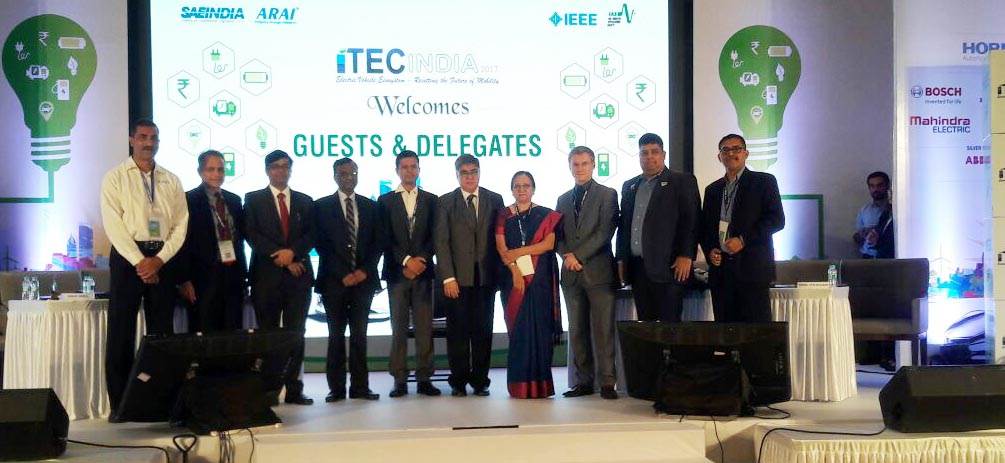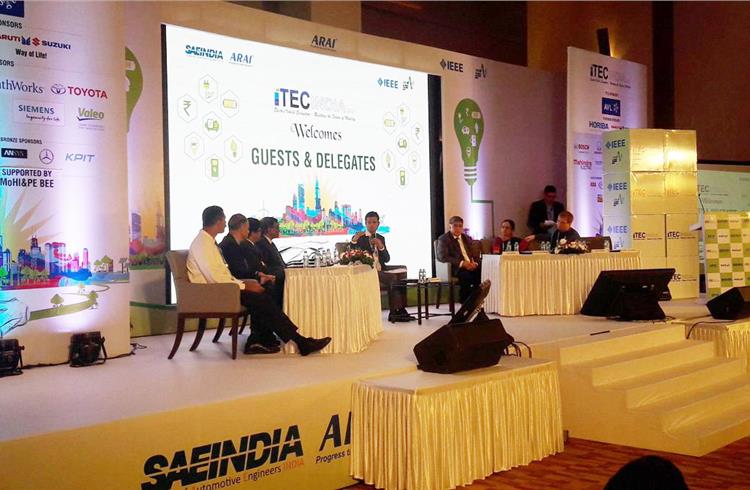High localisation vital if India is to be a strong EV market, say industry professionals
Top industry experts from Tata Motors, Maruti Suzuki India, KPIT Technologies, LG Chem, Horiba MIRA, Customized Energy Solutions , COEP and ARAI bullish on EVs for India but seek clear policy to develop a robust industry.
The subject of electric mobility and associated business opportunities is fast turning into the prime topic of discussion within India’s automotive industry and its key stakeholders as they evaluate EV manufacturing-related processes across the supply chain and the EV business model for the domestic market.
To delve deeper into the topic, explore the latest updates and also the challenges faced by India’s automotive industry, Autocar Professional’s Sumantra B Barooah today moderated a panel discussion on ‘Electric Vehicle Ecosystem – Resetting the Future of Mobility’ on the sidelines of iTEC India 2017 being held at ARAI, Pune.
The panel discussion saw participation from Dr Ajit Jindal, Head – ERC, Commercial Vehicles, Tata Motors; Dr Prabhakar Patil, CEO, LG Chem; Greg Harris, Head of Commercial – Special Projects & New Tech, Horiba MIRA; Anup Sable, chief technology officer, KPIT Technologies; Dr Tapan Sahoo, senior vice-president, Maruti Suzuki India; Dr Rahul Walawalkar, executive director, IESA and president & MD, Customized Energy Solutions (India); Dr B B Ahuja, Director, College of Engineering Pune (COEP) and Mrs Rashmi Urdhwareshe, director, ARAI.

University level research and academic institutions play a pivotal role in not just spearheading new technologies and their business models but they also are capable grooming grounds for next-generation engineers. Giving his perspective on current industry challenges and representing the academic side, Dr Ahuja of , College of Engineering Pune stated that technologies with mass impact must advance gradually. “Petrol- and diesel-run vehicles must advance to hybrids first, followed by pure electric vehicles,” he said.
He also revealed that a committee formed under the Ministry of HRD is working on designing an all-new course curriculum on electric mobility for engineering students. “Going forward, I see that mechanical engineering, electronics, computer science and other disciplines will not exist as separate topics. Instead, they will all merge together as one course. I foresee engineers studying and specialising in multiple topics in future,” he added.
Giving ARAI’s outlook, Mrs Urdhwareshe said, “There will be four primary pillars that will set the tone of a thriving industry around electric mobility in India. They are country-specific indigenous product development, standardisation, regulatory support and testing and validation.”
Looking at building a capable supply chain, Dr Tapan Sahoo of Maruti Suzuki said that (large) scale is required to attract investments that could help in developing the required competencies in electric mobility domain. “Localisation of battery technologies, DC-DC converter, electric motors and other associated parts are necessary for making the business model around the electric vehicles a viable case,” he stated.
“The supplier community seems to be ready and is seeking clear policy signals from the government authorities to be able to make future investments in developing the market for electric mobility in India,” said Dr Ajit Jindal of Tata Motors.
Interestingly, according to him, the public transportation system in India currently consists of about 40,000 buses. “The actual requirement is of close to 600,000 buses plying on the roads in India as part of an effective public transportation. The government must encourage private companies in driving investments and innovation in this area. Electric buses offer a self-sustainable model as they can retrieve all costs incurred within 10 years. Power charging provided at low fares can also provide a big boost to the operating economics of electric buses,” highlighted Dr Jindal.
Citing China’s example, Dr Tapan Sahoo of Maruti Suzuki India said that the battery supply chain already exists in China and that is one of the key parameters behind its thriving electric vehicle industry. “We need to build that in India,” he said.
"While NITI Aayog's ambition is 40 percent BEVs by 2030 for personal vehicles, adopting HEVs and PHEVs with suitable policy measures will provide the required scale for EV component manufacturing as well," stated Dr Sahoo.
Anup Sable of KPIT Technologies, who is bullish that India will be become a major EV market globally in the years to come, believes that electric buses will take the lead in driving the adoption of EVs in India.
Read more: Union minister Anant Geete bats for pragmatic approach to future mobility tech
'E-mobility presents a huge opportunity for India': Dr Abhay Firodia
Global EV sales accelerate in first nine months of 2017, China leads the charge: JATO Dynamics study
RELATED ARTICLES
Bosch hydrogen engine tech-powered truck to be on Indian roads this year
The global supplier of technology and services is betting big on both electromobility and hydrogen. While announcing the...
IIT Bombay inaugurates Arun Firodia Research Floor
IIT Bombay, one of India’s top technical and research institutions, honours Kinetic Group chairman Dr Arun Firodia, one ...
Maruti Suzuki expands capacity at Manesar plant by additional 100,000 units
New assembly line at Plant A expands total manufacturing capacity at the Manesar plants to 900,000 units per annum. Alon...





 15 Dec 2017
15 Dec 2017
 6659 Views
6659 Views





 Autocar Pro News Desk
Autocar Pro News Desk




